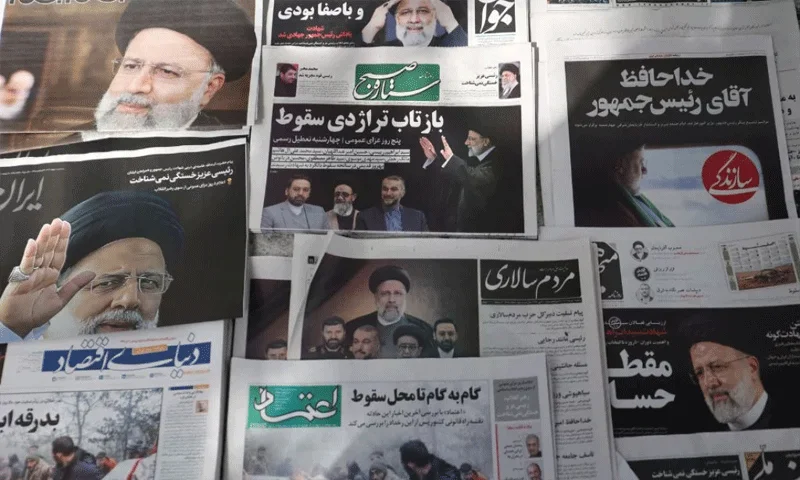Raisi death reshapes Iran succession, puts focus on Khamenei son
Share on:

Mojtaba Khamenei emerges as a key contender for Ayatollah Khamenei's successor Concerns over dynastic succession in Iran prompt consideration of alternative candidates
The death in a helicopter crash of president Ebrahim Raisi, seen as a possible successor to supreme leader Ayatollah Ali Khamenei, has reshuffled the cards in the succession process and increased the spotlight on the Iranian number one's son Mojtaba as a contender.
While analysts emphasize it is impossible to know for sure the intentions of Iran's leadership, Raisi's record as a pillar of the Islamic republic over several decades made him an inevitable candidate to become its third supreme leader after Khamenei and revolutionary leader Ayatollah Ruhollah Khomeini.
The supreme leader serves for life after being appointed by the Assembly of Experts body and has the final say on all key matters including foreign policy. Khamenei, 85, has held the post since Khomeini's death in 1989.
Ali Fathollah-Nejad, director of the Berlin-based think tank Center for Middle East and Global Order, said it is "very hard to tell" if Raisi was seen as a successor but noted that Khamenei had "catapulted his longtime confidant into major positions."
These included head of the judiciary and the presidency, indicating "a desire to provide him with the kind of profile that would facilitate his ascendancy to the supreme leadership," he told AFP.
"In Iran's opaque political environment, none but a handful at the top know how likely Raisi was to become the next supreme leader," added analysts Ali Vaez and Naysan Rafati of the International Crisis Group in a study.
‘Cards reshuffled’
Other than Raisi, the other widely tipped contender was Khamenei's son Mojtaba, 54, a shadowy figure rarely seen in public but hugely influential behind the scenes and sanctioned by the United States.
"Khamenei has long desired to position his son Mojtaba as his successor," said Fathollah-Nejad, describing Mojtaba Khamenei as "a central actor in the shadows."
He emphasized that even within the Iranian leadership there were concerns over "dynastic rule" given how this was so vehemently rejected by the Islamic revolutionaries who ousted the last shah.
"Now, however, with Raisi's demise, the cards regarding Khamenei's succession are reshuffled. As a result, the focus of attention now shifts back to Mojtaba," he said.
Keeping a low public profile, rarely mentioned in media reports and without any official title, Mojtaba Khamenei is believed by observers to be the second-in-command at the office of the supreme leader behind the longstanding chief gatekeeper Mohammad Golpayegani.
One of the few official insights into his importance came in November 2019 when the US treasury announced sanctions against Mojtaba Khamenei, saying Ali Khamenei had "delegated a part of his leadership responsibilities" to his son.
Raisi's death would "reshape the looming succession process," said Suzanne Maloney, director of the foreign policy program at the Brookings Institution, adding Raisi had emerged in recent years as "one of the leading candidates" to succeed Khamenei.
Maloney said Mojtaba Khamenei was "the most prominent contender" aside from Raisi and a figure who has wielded "considerable power behind the scenes". But there were also questions over his religious credentials as well as hereditary governance, she added.
Analysts do not exclude that another name could emerge as a potential supreme leader with some attention focusing on Ali Reza Arafi, a cleric who is a member both of the Assembly of Experts and the Guardians Council oversight body.
‘Renewed popular protests’
Ensuring stability and continuity will be the number one priority for the leadership especially after the 2022 nationwide protests that exposed popular frustrations among young people over social restrictions in the Islamic republic, particularly for women.
Power in the Islamic republic has in the last years become ever more concentrated in the hands of conservatives, a trend confirmed by parliamentary elections this year that saw the lowest ever turnout in a legislative poll in Iran.
While the president's powers are limited, Raisi's death was still a shock -- he is only the second president of Iran to die in office after Mohammad Ali Rajai who was killed in a 1981 bomb attack after less than a month in office.
Fathollah-Nejad said that in the wake of the 2022 protests and an ever-deepening economic crisis in the face of Western sanctions, the transition of power to a new supreme leader would represent a risky period for the authorities.
Source: AFP

